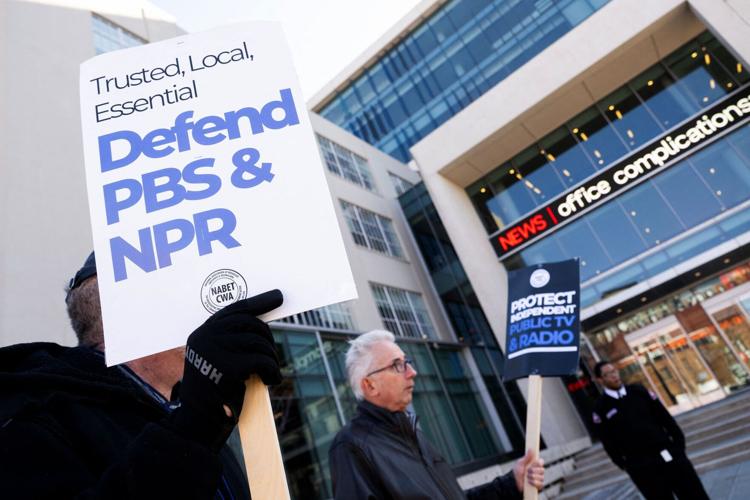President Donald Trump signed an executive order on Thursday evening seeking to prohibit federal funding for NPR and the Public Broadcasting Service (PBS). The order, which could be subject to legal challenge, called the broadcasters’ news coverage “biased and partisan.”
It instructs the Corporation for Public Broadcasting to cease providing direct funds to either broadcaster. It also orders CPB to cease indirect funding of the services through grants to local public radio and television stations.
CPB is the main distributor of federal funds to public media. It receives about $535 million in federal funds per fiscal year, which it mostly spends on grants to hundreds of stations nationwide. The stations spend the grants on making their own programming or on buying programming from services such as NPR and PBS.
CPB, created by an act of Congress in 1967, also sometimes provides direct grants to NPR and PBS to produce national programs.
Thursday’s order instructs the CPB board to ensure that stations receiving its grants “do not use Federal funds for NPR and PBS.”
The board must “cancel existing direct funding to the maximum extent allowed by law” to NPR and PBS and “decline to provide future funding,” it says.
It also instructs all federal agencies to “identify and terminate” any funding to the two broadcasters.
Trump and his allies have long accused NPR and PBS of favoring progressive positions. The heads of each network were grilled in March over alleged liberal bias at a congressional hearing titled “Anti-American Airwaves,” led by Rep. Marjorie Taylor Greene (R-Georgia). Both executives rejected the accusation.
“Each month, over 160 million television and online viewers explore the world through our trusted content,” Paula Kerger, president and CEO of PBS, said during the hearing.

In an emailed statement, an NPR spokesperson said early Friday that “NPR’s editorial practices and decision-making are independent and free from outside influence.”
“For more than 50 years, NPR has collaborated with local nonprofit public media organizations to fill critical needs for news and information in America’s communities,” the statement said, adding that “millions of Americans depend on NPR Member stations for rigorous, fact-based, public service journalism.”
“Federal funding is essential to the work of public media and all public media stations,” it said.
This week, CPB sued the Trump administration after it sent a letter to three board members attempting to terminate their positions. The lawsuit argues that the White House does not have authority over CPB because it is a nonprofit private corporation, not a federal agency. The lawsuit is ongoing, and Thursday’s order could be subject to a similarlegal challenge.
Last month, White House officials said the administration would ask Congress to rescind funding that had already been allocated to CPB. In a statement at the time, the White House provided a list of examples of what it called biased content, such as an NPR article with facts about “queer animals” and a PBS documentary about a transgender teenager. It also accused the broadcasters of having “zero tolerance for non-leftist viewpoints.”
PBS and CPB did not immediately respond to an overnight request for comment.
Last month, Kerger said in a statement in response to Trump administration threats to rescind federal funding that “there’s nothing more American than PBS, and our work is only possible because of the bipartisan support we have always received from Congress.”
CPB contributes about 1 percent of NPR’s budget and funds a portion of the hundreds of stations that license NPR content, according to the broadcaster. PBS is owned by its local member stations, which are usually partially funded by CPB grants. About 16 percent of its funding comes from the government, the service told The Washington Post in January.
An average of about one-eighth of local public-station funding comes from CPB, according to the corporation, with the remainder coming from sources such as donations and sponsorships.



